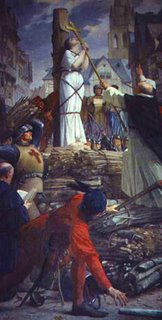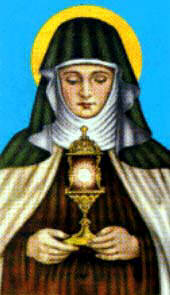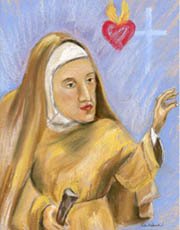
Joan d'Arc was born in the year 1412 to peasant stock her father, Jacques d'Arc was not known for his humour and struggled to maintain his patience in most things. Jacques wife, Isabelle made up for her husbands rather taciturn manner and was able to keep a happy home atmosphere especially as times were difficult in France as people struggled to maintain a viable lifestyle.
Things were made even more difficult in that France and England were still enmeshed in war, as England and Burgundy were able to conquer many regions in France. This brought much suffering to the people as the spoils of war went to the conquerors, this also fostered in the hearts of the French a deep dislike for the British. As each family prayed for their freedom to become one country united for the better good of all.
Joan lived her early life helping her Mother, with daily chores and learning from her mother the womanly skills that most need to run an economic home. For like many young people of her background Joan had little education, so along with her other siblings she learnt to sew, cook and also the various herbs needed to help in times of sickness.
But through the example of her mother, Joan also developed a love of prayer and the Church, and to help those who were even less fortunate than herself. Joan had inherited her mothers happy disposition and from her father she inherited a stubborn will and iron determination, all these traits would hold her in good stead.
It was at the young age of 14 that Joan started to experience visions with visits from St. Michael the Archangel who led the war against the great foe, Satan. She also had visions of St. Catherine of Alexandria and St. Margaret whereupon she promised to remain chaste for the rest of her life. Even though Joan was experiencing these mystical visions she still kept up with her chores and maintained her normality and total humility. She kept these visions in her heart of hearts for fear of her father finding out and ridiculing her voices.
Times were very difficult for the de'Arc family as it was for many in their region when sometimes at a moments notice they would have to flee from their homes as the enemy drew near. This made Jacque especially angry for like all French men he was proud of his country and longed for unity but not at any price. It also made it very difficult for this proud father to provide a good living for his family, as they struggled to feed and clothe themselves.
With her usual intuitive nature Joan sensed that the last thing her father would wish to hear was that she was the recipient of Divine messages, so she maintained her silence and prayed much to discover what God wished from her. Joan was also puzzled as to why God would choose her to do His Will when there were so many more knowledgeable people than herself. In true humility and meekness, Joan saw nothing special in and of herself.
This young girl also possessed an uncommon trust in her Lord and Savoir, and so would do all that He bid her to do at the request of her voices. After receiving them for near two years, Joan's mission was finally revealed to her, she a simple maiden would lead her beloved France to victory over England and to drive the English back to their native shores.
Joan's own disposition worked in her favour in that she was resolute, fiercely patriotic with a courage that surpassed many men, she was also determined to fulfil what God had requested of her, no matter the personal cost. Joan truly had the courage of a lion and the zeal of a prophet as she listened to her voices and obeyed them.
It was when Joan turned 16 years of age that the voices became urgent and so Joan set out to meet Robert de Baudricourt who was in command of the Princes forces. But upon receiving her Robert just as quickly dismissed her as a whimsical and silly girl who dreamed dreams, where as he commanded armies. Joan then returned back to her home accompanied by her Uncle, upon their return Joan tried to live a life of normalcy but the voices were insistent and told her with severity, "It is God who commands it."
Joan could not argue against God so she returned to see Robert de Baudricourt in secret, this proved fortuitous when their military position became so precarious that the English were at the door of Orleans itself! Robert agreed that Joan could speak with the Prince and sent with her 3 of his soldiers, Joan then set of on her mission dressed in the attire of a man in order to escape undue notice by the other soldiers. Joan eventually reached Chinon where the Prince held Court, but like Robert de Baudricourt he too was sceptical of this young girl who dressed as a young man. So he set a trap and when Joan received a summons to see the Prince he very craftily dressed himself as one of the servants, but Joan who had never seen the Prince recognised him immediately and walked with great purpose to the Prince, where she gave a sign that only the Prince and Joan knew of.
This led the Prince to pay more attention to this young peasant girl, even if members of his court were not quite so taken with her, Joan paid little heed to their sniping. But during this time Joan made an enemy of one of the Princes friend, La Tremouille who felt compelled to set on a mission to discredit Joan. So under direction from his friend La Tremouille Joan was sent to Poitiers in order to be questioned by the great theologians of the day.
The theologians sided with Joan and found no irregularities in her persona or beliefs and suggested that the Prince listen to this young woman with her message for France. Whereupon, Joan who had been totally exonerated returned to Chinon, to the Princes side, where she set out a plan to rid France of the dreaded English invaders at the behest of God. As an army was organized a banner was made bearing the words 'Jesus Maria' which also bore a picture of God the Father and of the fleur de lis which was the symbol of the Princes coat of arms.
When Joan and her army were ready she made a dazzling picture in her armour with her brunette hair cut short. She was fierce and unafraid at what faced her for she had placed all her trust in God and that was sufficient for her, for though she was merely a weak creature God would achieve great things through this young maiden. During their battles the soldiers too gained a new respect for this 'maid of Orleans' as she fought with them side by side, with more courage than any man they had ever seen, Joan truly showed no fear only fierce and determined courage! Even though she had been wounded in the battle Joan kept on fighting and kept up her raids on the English garrison.
Joan's fierceness also held a secret in that the voices told her she would not live a long life, so this gave Joan even greater incentive to keep going and continue to fight the British invaders. But once again Joan was kept waiting as La Tremouille insisted on negotiating a peace pact with the British, he was also supported by the Archbishop of Rheims. One can only wonder if La Tremouille was perhaps intent on discrediting Joan at any cost including selling out their own country. For it must have seemed incredulous to this man of great intelligence that the honour upon such a victory would be Joan's and not his!
With her usual doggedness Joan continued the war on the British troops as she fought them along the Loire with the assistance of Duc d'Alencon the fray ended with victory for both Joan and Duc d'Alencon at Patay, in which the English troops led by Sir John Falstoff were never able to regroup after this grievous defeat. Duc d'Alencon was filled with the glorious feeling of finally beating the unconquerable British forces!
Upon this major victory Joan was now insisting that the Prince be crowned King, as she tried to fulfil what God had requested of her through her voices. After some discussion the Prince was crowned King Charless VII in 1492. But the new King lacked Joan's courage and resolute character as he bandied back and forth from one courtier to another before making any decisions. This indecision shown by the King would lead to the first defeat suffered by Joan and the Duc d'Alencon at Paris, where once again Joan suffered an injury during the conflict.
But Joan was not one to sit back and accept defeat quietly and upon hearing of another campaign in Compiegne which was under attack by the Burgundians Joan once again rose to the challenge. Unfortunately Joan through a grave miscalculation was captured and held prisoner she was held captive by John of Luxembourg this was a great coup for John as he hoped it would demoralise the French troops. But Joan with typical courage jumped from the castle tower but her freedom was short-lived and to the shame of King Charles VII who made no attempt for Joan’s release.
The British with real venom wanted this woman who had been a scourge to them as she a young woman of limited education outwitted the greatest military tacticians of the day. The Burgundians eventually sold Joan to the British forces for 10 thousand francs. This great warrior woman was left to fend for herself, even though without her help King Charles VII would never have reached the throne!
Joan the suffered the indignity of a kangaroo court as allegations of witchcraft and sorcery were charged against her. And though Joan suffered many indignities this did not lessen her love of God nor question His Majestic Wisdom. If anything Joan would often outwit her persecutors as she answered their loaded questions with honesty, integrity, piety and shrewdness.
But though Joan was shrewd she was also not a theologian and with trick questions the 'courts' were able to use this against her and with great shame the theologians at the university of Paris gave their ascent to Joan's misguided responses which helped seal her doom!
Upon being proclaimed guilty of sorcery Joan was then given the chance to escape the death sentence if she confessed that her voices were of the devil and not of God. Joan who in a moment of weakness upon seeing the pyre of wood fell to her knees and agreed that she had spoken falsely. But upon being led back to her prison, Joan's courage shone through and she re-canted her momentary lapse into weakness. This momentary faintheartedness shown by Joan merely solidifies her true and real courage, for we must remember this was a young girl, who was facing the most horrific way of dying, being burnt alive. She faced up to this with heroic bravery for one so young, she truly was a soldier for God!
Joan never wavered in her love for God and even though the events in her life led to her doom, she continued to show that one must not only live for what they believe but one must also die for the same beliefs.
Joan decided she could not live with a lie, but she could die for truth, and with true heroic virtue she did just that.
Joan d' Arc died in 1431.
Saint Joan of Arc was canonized in 1920 by Pope Benedict XV.
Peace of Christ to ALL
Copyright © 2005 Marie Smith. All rights reserved.



